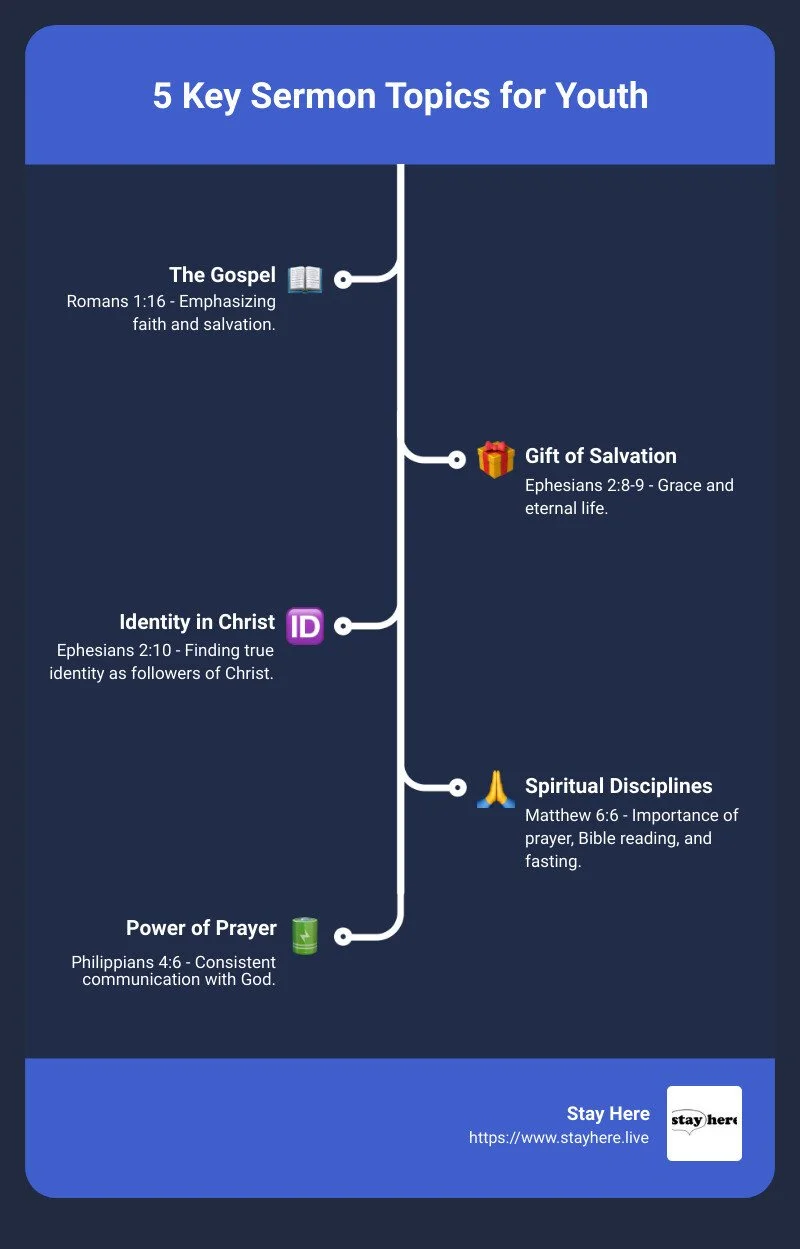Youth Sermons That Stick: Engaging and Inspiring Messages
Image Alt Text: youth ministry - sermon for youth
If you're looking for engaging and inspiring sermon topics for youth that can make a real difference, here are some key ideas:
The Gospel and Salvation - Romans 1:16, Ephesians 2:8-9
Identity in Christ - Ephesians 2:10
Spiritual Disciplines like Prayer and Bible Reading - Matthew 6:6
Power of Prayer - Philippians 4:6
Connecting with young people through youth ministry requires sermons that are both engaging and inspiring. These sermons need to resonate with their life experiences while addressing significant aspects of mental health and faith-based principles.
Being able to capture the attention of teenagers and young adults and hold it effectively is no small feat. It requires understanding their questions, fears, and challenges, and delivering messages that touch on these areas meaningfully.
I'm Jacob Coyne, a speaker and founder of Stay Here. I've spent years developing sermons and speaking to youth to address their spiritual and mental health needs.
Let's dig deeper into how we can create impactful and life-changing sermons for youth.
Image Alt Text: Youth Sermon Ideas Infographic - sermon for youth infographic infographic-line-5-steps
Understanding the Needs of Youth
To create impactful sermons for youth, we must first understand their unique needs. Young people today face a myriad of questions, fears, and challenges. Addressing these issues with relevance and depth is crucial for engaging their hearts and minds.
Questions
Young people are naturally curious and constantly questioning the world around them. They wonder about their purpose, the nature of God, and how their faith fits into their daily lives.
Example: A teenager might ask, "How can I know God's plan for my life?" This question opens the door for a sermon on following God's guidance, using scriptures like Jeremiah 29:11.
Fears
Fear is a common experience for youth. They worry about their future, peer acceptance, and the state of the world. Addressing these fears with the assurance found in God's Word can bring them peace.
Scripture: "For God has not given us a spirit of fear and timidity, but of power, love, and self-discipline." - 2 Timothy 1:7
Challenges
Today's youth face unique challenges such as social media pressure, mental health issues, and the struggle to maintain purity in a world filled with temptation.
Illustration: Share a story about a young person who overcame social media pressure by focusing on their identity in Christ, aligning with Ephesians 2:10.
Relevance
Sermons must be relevant to the lives of young people. This means talking about the issues they face every day and showing how the Bible speaks directly to those issues.
Example: Discuss the importance of healthy relationships and communication, using Proverbs 17:17 as a guiding verse.
Depth
While relevance is important, depth ensures that the message is not superficial. Youth need to understand the deeper truths of their faith and how to apply them in real life.
Quote: "Worship is why we spend time focused on God, telling him what we think about him in love and adoration." This quote emphasizes that worship is more than just an event; it's a lifestyle.
By addressing these areas thoughtfully, we can craft sermons that not only engage youth but also inspire and guide them in their spiritual journeys.
Next, we will explore five powerful sermon topics that resonate deeply with young people.
5 Powerful Sermon Topics for Youth
The Gospel
One of the most important messages to share with youth is the Gospel. The Gospel is the core message of Christianity, emphasizing Jesus' life, death, and resurrection.
Key Verse:
"For I am not ashamed of the gospel, because it is the power of God that brings salvation to everyone who believes: first to the Jew, then to the Gentile." - Romans 1:16
Application: Discuss the significance of the Gospel and how it changes lives. This topic can lead to conversations about evangelism and sharing one's faith.
The Gift of Salvation
Understanding salvation is crucial for every believer. It’s essential to explain that salvation is a gift from God, received through faith and not by our own efforts.
Key Verse:
"For it is by grace you have been saved, through faith—and this is not from yourselves, it is the gift of God - not by works, so that no one can boast." - Ephesians 2:8-9
Application: Explain the process of salvation and its implications. Discuss faith, repentance, and the assurance of salvation.
Finding Identity in Christ
Teenagers often struggle with their identity. Teaching them about their identity in Christ helps them understand their true worth and purpose.
Key Verse:
"For we are God’s handiwork, created in Christ Jesus to do good works, which God prepared in advance for us to do." - Ephesians 2:10
Application: Help students understand their new identity in Christ. Discuss how this identity impacts their self-worth, decisions, and interactions with others.
Spiritual Disciplines
Spiritual disciplines are practices that help believers grow in their faith. Encouraging youth to develop these habits can strengthen their relationship with God.
Key Verse:
"But when you pray, go into your room, close the door, and pray to your Father, who is unseen. Then your Father, who sees what is done in secret, will reward you." - Matthew 6:6
Application: Introduce habits like prayer, Bible reading, fasting, and worship. Discuss how these practices can lead to a deeper understanding of God's Word and His will for their lives.
The Power of Prayer
Prayer is a powerful tool for believers. Teaching youth about the importance and power of prayer can encourage them to pursue God consistently.
Key Verse:
"Do not be anxious about anything, but in every situation, by prayer and petition, with thanksgiving, present your requests to God." - Philippians 4:6
Application: Teach students how to pray effectively. Discuss different types of prayer and share testimonies of answered prayers.
Next, we will address common youth issues such as peer pressure, relationships, and mental health, and how to integrate these topics into engaging sermons.
Addressing Common Youth Issues
Peer Pressure
Peer pressure is a significant challenge for many teenagers. They often face pressure to conform to the behaviors and expectations of their friends. This can lead to poor decision-making and negative consequences.
Key Verse:
"Do not be misled: 'Bad company corrupts good character.'" - 1 Corinthians 15:33
Illustration: Share a personal story or a case study about a young person who faced peer pressure. Explain how they made a wise decision by standing firm in their faith and the positive outcomes that followed.
Application: Encourage youth to seek friendships that uplift and encourage their walk with God. Discuss practical ways to resist peer pressure, like setting boundaries and seeking support from trusted mentors.
Relationships
Navigating relationships, whether with friends or romantic partners, can be complex for teenagers. Biblical principles such as communication, forgiveness, and mutual respect are essential for healthy relationships.
Key Verse:
"A friend loves at all times, and a brother is born for a time of adversity." - Proverbs 17:17
Illustration: Share a story of a young person who struggled with a friendship or romantic relationship. Highlight how they applied biblical principles to resolve conflicts and strengthen their relationships.
Application: Teach youth the importance of open and honest communication. Discuss the value of forgiveness and how it can heal and restore relationships. Encourage them to show respect and love in all their interactions.
Mental Health
Mental health is a growing concern among teenagers. They face fears and anxieties about school, their future, and the world around them. Scripture offers comfort and guidance for overcoming these fears.
Key Verse:
"For God has not given us a spirit of fear and timidity, but of power, love, and self-discipline." - 2 Timothy 1:7
Illustration: Share a story of a young person who struggled with anxiety or fear. Explain how they found peace through their faith in God and support from their community.
Application: Encourage youth to seek peace through prayer, reading the Bible, and talking to trusted mentors. Discuss practical ways to manage anxiety, such as mindfulness and relying on God's promises.
Self-Worth
In a culture that often promotes unrealistic standards of beauty and success, many teenagers struggle with low self-esteem. It's vital to remind them of their worth and value in God.
Key Verse:
"I praise you because I am fearfully and wonderfully made; your works are wonderful, I know that full well." - Psalm 139:14
Illustration: Share a story of a young person who struggled with self-worth. Highlight how they finded their true value in God and the positive changes that followed.
Application: Teach youth to find their identity in Christ rather than in societal standards. Encourage them to celebrate their unique qualities and trust that God has a specific plan for their lives.
Temptation
Temptation is a common struggle for teenagers. They need guidance on how to resist and make wise choices.
Key Verse:
"No temptation has overtaken you except what is common to mankind. And God is faithful; he will not let you be tempted beyond what you can bear. But when you are tempted, he will also provide a way out so that you can endure it." - 1 Corinthians 10:13
Illustration: Share a story of a young person who faced temptation. Explain how they relied on God's strength to resist and the positive consequences that resulted.
Application: Discuss practical strategies for resisting temptation, such as avoiding compromising situations and seeking accountability. Encourage youth to rely on God's strength and wisdom in making decisions.
Next, we will explore engaging sermon techniques that can make these messages resonate with youth, including the use of personal stories, illustrations, and interactive elements.
Engaging Sermon Techniques
Personal Stories
Personal stories create a strong connection with your youth audience. They make your message relatable and authentic. Sharing real-life experiences, whether your own or someone else's, can illustrate how biblical principles apply to everyday life.
Example: Share a personal story about a time you faced peer pressure. Describe the challenges you encountered and how you relied on your faith to make the right decision. This helps youth see that they are not alone in their struggles.
Illustrations
Illustrations help to visualize and simplify complex concepts. Using visual aids, metaphors, and parables can make your message more engaging and easier to understand.
Example: Use the parable of the pencil to illustrate life lessons. Explain how, like a pencil, youth need to be sharpened through challenges, rely on their inner qualities, and leave a positive mark on the world.
Visual Aid:
Image Alt Text: pencil illustration - sermon for youth
Interactive Elements
Interactive elements keep youth engaged and involved in the sermon. Activities like Q&A sessions, group discussions, and hands-on activities can make the learning experience more dynamic and memorable.
Example: During a sermon on the power of prayer, have a Q&A session where youth can ask questions about prayer. Follow this with a group activity where they write down their prayer requests and pray for each other.
Activity:
Image Alt Text: group prayer activity - sermon for youth
Relatable Examples
Using modern-day scenarios and references from youth culture can make your sermons more relevant. Relate biblical teachings to situations that youth face in their daily lives, such as social media pressures or school challenges.
Example: Discuss how social media can impact self-worth. Use biblical principles to explain how their value comes from God, not the number of likes or followers they have.
Modern-Day Scenario:
Image Alt Text: social media impact - sermon for youth
By incorporating these engaging sermon techniques, you can make your messages more impactful and resonate deeply with the youth. Next, let's address some frequently asked questions about crafting a compelling sermon for youth.
Frequently Asked Questions about Sermon for Youth
What are good sermon topics for youth?
When crafting a sermon for youth, it's crucial to choose topics that resonate with their experiences and challenges. Here are some powerful sermon topics:
The Gospel: Romans 1:16 emphasizes the power of the gospel for salvation. Explain why the gospel is central to Christian faith and how it can transform lives.
Salvation: Ephesians 2:8-9 teaches that salvation is a gift from God, received through faith. Highlight the concept of grace and the assurance of eternal life.
Identity in Christ: Ephesians 2:10 encourages youth to find their identity in Christ rather than in worldly standards. Discuss how being a follower of Christ shapes their true identity.
Spiritual Disciplines: Matthew 6:6 underscores the importance of prayer, Bible reading, and fasting. Explain how these practices can deepen their relationship with God.
The Power of Prayer: Philippians 4:6 shows the importance of communicating with God. Encourage consistency in prayer and trusting God with their anxieties.
What is the inspiring Bible message for youth?
An inspiring Bible message for youth can be found in Isaiah 40:29-31:
"He gives strength to the weary and increases the power of the weak. Even youths grow tired and weary, and young men stumble and fall; but those who hope in the Lord will renew their strength. They will soar on wings like eagles; they will run and not grow weary, they will walk and not be faint."
This passage offers hope and strength, reminding youth that relying on God will sustain them through life's challenges.
What topics should you discuss with youth in church?
Addressing relevant and sometimes difficult topics is essential to a well-rounded youth ministry. Here are some crucial areas to cover:
Drugs and Alcohol: Discuss the dangers and consequences, and provide biblical guidance on making wise choices.
Sex: Offer a biblical perspective on purity and the importance of respecting oneself and others.
Bullying: Use biblical principles to promote kindness, empathy, and standing up against bullying.
Mental Health: Incorporate scriptures like Psalm 34:17-20 to offer comfort and guidance for those struggling with anxiety, depression, or other mental health issues.
Body Image: Teach that their worth comes from being God's creation, as stated in Psalm 139:14.
LGBTQ+ Issues: Approach this topic with sensitivity, emphasizing God's love for all individuals and the importance of compassion and understanding.
Race and Social Justice: Discuss biblical justice and equality, encouraging youth to stand against racism and advocate for social justice.
Politics: While maintaining a focus on biblical values, encourage respectful dialogue and understanding of different perspectives.
By addressing these topics, you provide youth with a holistic understanding of how their faith intersects with everyday life. Next, let's explore how to create sermons that are both engaging and inspiring for youth.
Conclusion
At Stay Here, we believe in the power of youth ministry to transform lives and build a supportive community. Our mission is to empower youth by providing them with the tools, lessons, and support they need to grow in their faith and steer life's challenges.
Mental health is a critical issue among young people today. Every 40 seconds, someone loses their life to suicide. But together, we can change that. Our comprehensive approach combines faith-based teachings with practical mental health resources to create a holistic support system for young people.
Suicide prevention is at the heart of what we do. Through our ACT Suicide Prevention Training, we equip leaders and students with the knowledge to identify and respond to signs of suicidal thoughts. Additionally, we offer free therapy through partnerships with services like BetterHelp, providing one month of free counseling to students in need.
Jacob Coyne, the founder of Stay Here, is dedicated to raising awareness through bold and encouraging messaging. His book, "Stay Here: Uncovering God's Plan to Restore Your Mental Health," is a valuable resource that addresses mental health from a faith-based perspective, offering hope and practical steps for healing.
By integrating these resources into your youth ministry, you can create a nurturing environment where students feel valued, understood, and empowered to thrive. Together, we can support one another, draw strength from our faith, and build a brighter future for the next generation.
Explore our church resources to find everything you need to make a lasting impact in your youth ministry. Choose to stay here. Join us in making a difference and let's work together to create a suicide-free generation. Your future is bright, and you are loved. The world is better with you in it, and your story isn't over yet. Let's take this journey together, one step at a time.




